Entrepreneurial Characteristics and Success in Small Businesses
VerifiedAdded on 2019/12/28
|13
|4810
|509
Report
AI Summary
The provided content discusses various aspects of small business management and entrepreneurship, including success criteria for entrepreneurs, entrepreneurial motivations, and the relationship between entrepreneurial competency and business success. The articles also touch on the importance of small businesses in the UK economy and provide insights into the characteristics of successful entrepreneurs.
Contribute Materials
Your contribution can guide someone’s learning journey. Share your
documents today.

Entrepreneurship and Small
Business Management
1
Business Management
1
Secure Best Marks with AI Grader
Need help grading? Try our AI Grader for instant feedback on your assignments.
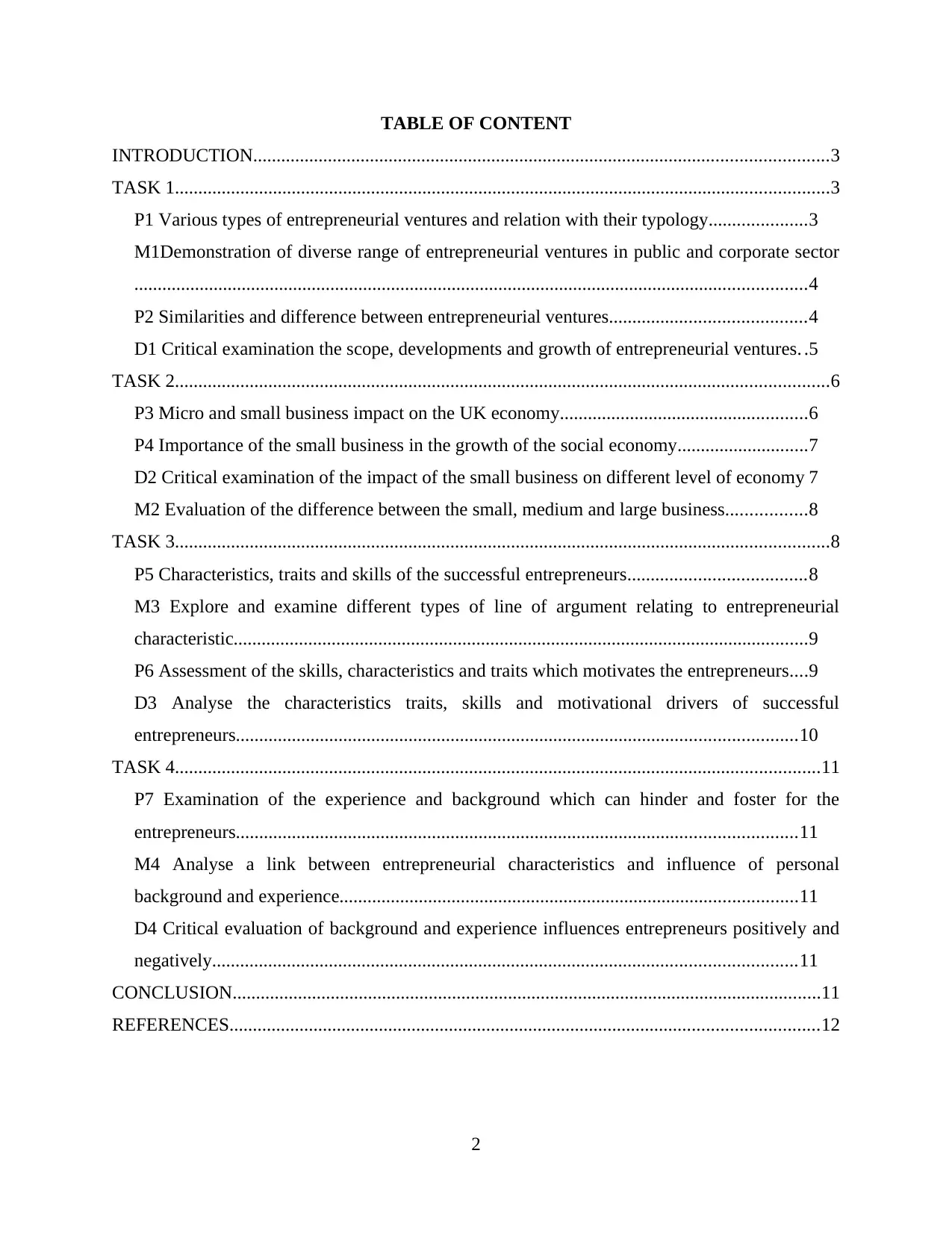
TABLE OF CONTENT
INTRODUCTION...........................................................................................................................3
TASK 1............................................................................................................................................3
P1 Various types of entrepreneurial ventures and relation with their typology.....................3
M1Demonstration of diverse range of entrepreneurial ventures in public and corporate sector
................................................................................................................................................4
P2 Similarities and difference between entrepreneurial ventures..........................................4
D1 Critical examination the scope, developments and growth of entrepreneurial ventures. .5
TASK 2............................................................................................................................................6
P3 Micro and small business impact on the UK economy.....................................................6
P4 Importance of the small business in the growth of the social economy............................7
D2 Critical examination of the impact of the small business on different level of economy 7
M2 Evaluation of the difference between the small, medium and large business.................8
TASK 3............................................................................................................................................8
P5 Characteristics, traits and skills of the successful entrepreneurs......................................8
M3 Explore and examine different types of line of argument relating to entrepreneurial
characteristic...........................................................................................................................9
P6 Assessment of the skills, characteristics and traits which motivates the entrepreneurs....9
D3 Analyse the characteristics traits, skills and motivational drivers of successful
entrepreneurs........................................................................................................................10
TASK 4..........................................................................................................................................11
P7 Examination of the experience and background which can hinder and foster for the
entrepreneurs........................................................................................................................11
M4 Analyse a link between entrepreneurial characteristics and influence of personal
background and experience..................................................................................................11
D4 Critical evaluation of background and experience influences entrepreneurs positively and
negatively.............................................................................................................................11
CONCLUSION..............................................................................................................................11
REFERENCES..............................................................................................................................12
2
INTRODUCTION...........................................................................................................................3
TASK 1............................................................................................................................................3
P1 Various types of entrepreneurial ventures and relation with their typology.....................3
M1Demonstration of diverse range of entrepreneurial ventures in public and corporate sector
................................................................................................................................................4
P2 Similarities and difference between entrepreneurial ventures..........................................4
D1 Critical examination the scope, developments and growth of entrepreneurial ventures. .5
TASK 2............................................................................................................................................6
P3 Micro and small business impact on the UK economy.....................................................6
P4 Importance of the small business in the growth of the social economy............................7
D2 Critical examination of the impact of the small business on different level of economy 7
M2 Evaluation of the difference between the small, medium and large business.................8
TASK 3............................................................................................................................................8
P5 Characteristics, traits and skills of the successful entrepreneurs......................................8
M3 Explore and examine different types of line of argument relating to entrepreneurial
characteristic...........................................................................................................................9
P6 Assessment of the skills, characteristics and traits which motivates the entrepreneurs....9
D3 Analyse the characteristics traits, skills and motivational drivers of successful
entrepreneurs........................................................................................................................10
TASK 4..........................................................................................................................................11
P7 Examination of the experience and background which can hinder and foster for the
entrepreneurs........................................................................................................................11
M4 Analyse a link between entrepreneurial characteristics and influence of personal
background and experience..................................................................................................11
D4 Critical evaluation of background and experience influences entrepreneurs positively and
negatively.............................................................................................................................11
CONCLUSION..............................................................................................................................11
REFERENCES..............................................................................................................................12
2
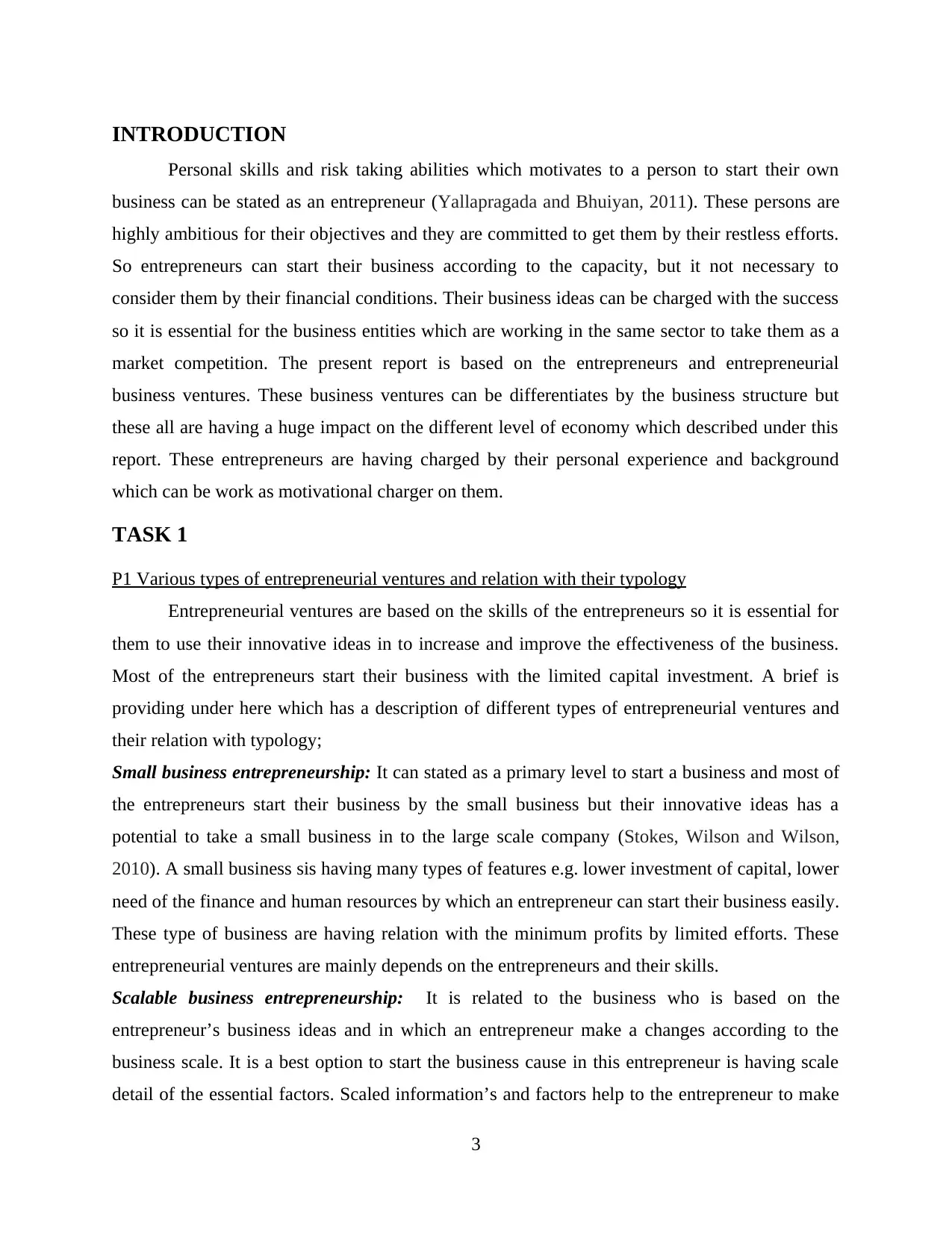
INTRODUCTION
Personal skills and risk taking abilities which motivates to a person to start their own
business can be stated as an entrepreneur (Yallapragada and Bhuiyan, 2011). These persons are
highly ambitious for their objectives and they are committed to get them by their restless efforts.
So entrepreneurs can start their business according to the capacity, but it not necessary to
consider them by their financial conditions. Their business ideas can be charged with the success
so it is essential for the business entities which are working in the same sector to take them as a
market competition. The present report is based on the entrepreneurs and entrepreneurial
business ventures. These business ventures can be differentiates by the business structure but
these all are having a huge impact on the different level of economy which described under this
report. These entrepreneurs are having charged by their personal experience and background
which can be work as motivational charger on them.
TASK 1
P1 Various types of entrepreneurial ventures and relation with their typology
Entrepreneurial ventures are based on the skills of the entrepreneurs so it is essential for
them to use their innovative ideas in to increase and improve the effectiveness of the business.
Most of the entrepreneurs start their business with the limited capital investment. A brief is
providing under here which has a description of different types of entrepreneurial ventures and
their relation with typology;
Small business entrepreneurship: It can stated as a primary level to start a business and most of
the entrepreneurs start their business by the small business but their innovative ideas has a
potential to take a small business in to the large scale company (Stokes, Wilson and Wilson,
2010). A small business sis having many types of features e.g. lower investment of capital, lower
need of the finance and human resources by which an entrepreneur can start their business easily.
These type of business are having relation with the minimum profits by limited efforts. These
entrepreneurial ventures are mainly depends on the entrepreneurs and their skills.
Scalable business entrepreneurship: It is related to the business who is based on the
entrepreneur’s business ideas and in which an entrepreneur make a changes according to the
business scale. It is a best option to start the business cause in this entrepreneur is having scale
detail of the essential factors. Scaled information’s and factors help to the entrepreneur to make
3
Personal skills and risk taking abilities which motivates to a person to start their own
business can be stated as an entrepreneur (Yallapragada and Bhuiyan, 2011). These persons are
highly ambitious for their objectives and they are committed to get them by their restless efforts.
So entrepreneurs can start their business according to the capacity, but it not necessary to
consider them by their financial conditions. Their business ideas can be charged with the success
so it is essential for the business entities which are working in the same sector to take them as a
market competition. The present report is based on the entrepreneurs and entrepreneurial
business ventures. These business ventures can be differentiates by the business structure but
these all are having a huge impact on the different level of economy which described under this
report. These entrepreneurs are having charged by their personal experience and background
which can be work as motivational charger on them.
TASK 1
P1 Various types of entrepreneurial ventures and relation with their typology
Entrepreneurial ventures are based on the skills of the entrepreneurs so it is essential for
them to use their innovative ideas in to increase and improve the effectiveness of the business.
Most of the entrepreneurs start their business with the limited capital investment. A brief is
providing under here which has a description of different types of entrepreneurial ventures and
their relation with typology;
Small business entrepreneurship: It can stated as a primary level to start a business and most of
the entrepreneurs start their business by the small business but their innovative ideas has a
potential to take a small business in to the large scale company (Stokes, Wilson and Wilson,
2010). A small business sis having many types of features e.g. lower investment of capital, lower
need of the finance and human resources by which an entrepreneur can start their business easily.
These type of business are having relation with the minimum profits by limited efforts. These
entrepreneurial ventures are mainly depends on the entrepreneurs and their skills.
Scalable business entrepreneurship: It is related to the business who is based on the
entrepreneur’s business ideas and in which an entrepreneur make a changes according to the
business scale. It is a best option to start the business cause in this entrepreneur is having scale
detail of the essential factors. Scaled information’s and factors help to the entrepreneur to make
3
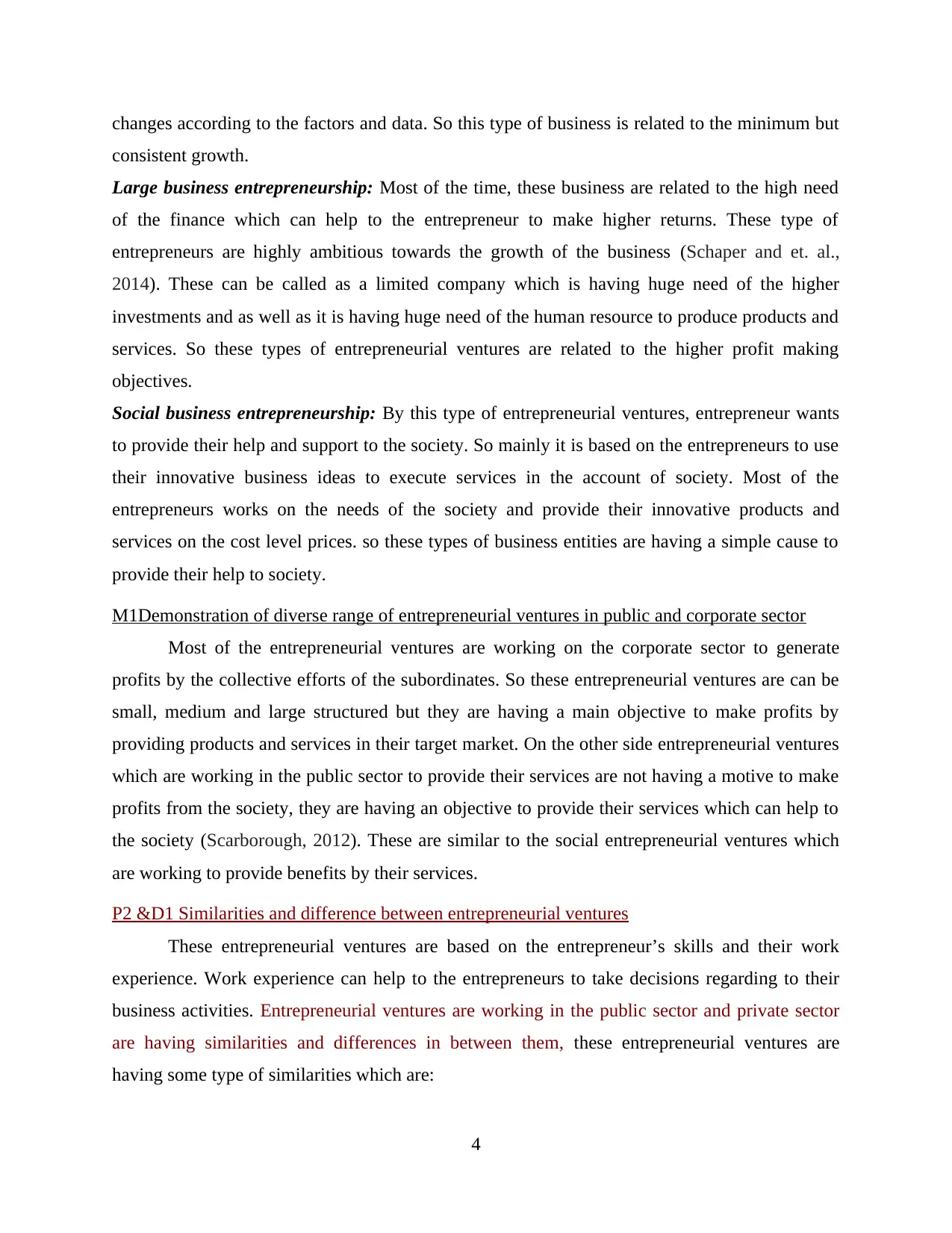
changes according to the factors and data. So this type of business is related to the minimum but
consistent growth.
Large business entrepreneurship: Most of the time, these business are related to the high need
of the finance which can help to the entrepreneur to make higher returns. These type of
entrepreneurs are highly ambitious towards the growth of the business (Schaper and et. al.,
2014). These can be called as a limited company which is having huge need of the higher
investments and as well as it is having huge need of the human resource to produce products and
services. So these types of entrepreneurial ventures are related to the higher profit making
objectives.
Social business entrepreneurship: By this type of entrepreneurial ventures, entrepreneur wants
to provide their help and support to the society. So mainly it is based on the entrepreneurs to use
their innovative business ideas to execute services in the account of society. Most of the
entrepreneurs works on the needs of the society and provide their innovative products and
services on the cost level prices. so these types of business entities are having a simple cause to
provide their help to society.
M1Demonstration of diverse range of entrepreneurial ventures in public and corporate sector
Most of the entrepreneurial ventures are working on the corporate sector to generate
profits by the collective efforts of the subordinates. So these entrepreneurial ventures are can be
small, medium and large structured but they are having a main objective to make profits by
providing products and services in their target market. On the other side entrepreneurial ventures
which are working in the public sector to provide their services are not having a motive to make
profits from the society, they are having an objective to provide their services which can help to
the society (Scarborough, 2012). These are similar to the social entrepreneurial ventures which
are working to provide benefits by their services.
P2 &D1 Similarities and difference between entrepreneurial ventures
These entrepreneurial ventures are based on the entrepreneur’s skills and their work
experience. Work experience can help to the entrepreneurs to take decisions regarding to their
business activities. Entrepreneurial ventures are working in the public sector and private sector
are having similarities and differences in between them, these entrepreneurial ventures are
having some type of similarities which are:
4
consistent growth.
Large business entrepreneurship: Most of the time, these business are related to the high need
of the finance which can help to the entrepreneur to make higher returns. These type of
entrepreneurs are highly ambitious towards the growth of the business (Schaper and et. al.,
2014). These can be called as a limited company which is having huge need of the higher
investments and as well as it is having huge need of the human resource to produce products and
services. So these types of entrepreneurial ventures are related to the higher profit making
objectives.
Social business entrepreneurship: By this type of entrepreneurial ventures, entrepreneur wants
to provide their help and support to the society. So mainly it is based on the entrepreneurs to use
their innovative business ideas to execute services in the account of society. Most of the
entrepreneurs works on the needs of the society and provide their innovative products and
services on the cost level prices. so these types of business entities are having a simple cause to
provide their help to society.
M1Demonstration of diverse range of entrepreneurial ventures in public and corporate sector
Most of the entrepreneurial ventures are working on the corporate sector to generate
profits by the collective efforts of the subordinates. So these entrepreneurial ventures are can be
small, medium and large structured but they are having a main objective to make profits by
providing products and services in their target market. On the other side entrepreneurial ventures
which are working in the public sector to provide their services are not having a motive to make
profits from the society, they are having an objective to provide their services which can help to
the society (Scarborough, 2012). These are similar to the social entrepreneurial ventures which
are working to provide benefits by their services.
P2 &D1 Similarities and difference between entrepreneurial ventures
These entrepreneurial ventures are based on the entrepreneur’s skills and their work
experience. Work experience can help to the entrepreneurs to take decisions regarding to their
business activities. Entrepreneurial ventures are working in the public sector and private sector
are having similarities and differences in between them, these entrepreneurial ventures are
having some type of similarities which are:
4
Secure Best Marks with AI Grader
Need help grading? Try our AI Grader for instant feedback on your assignments.
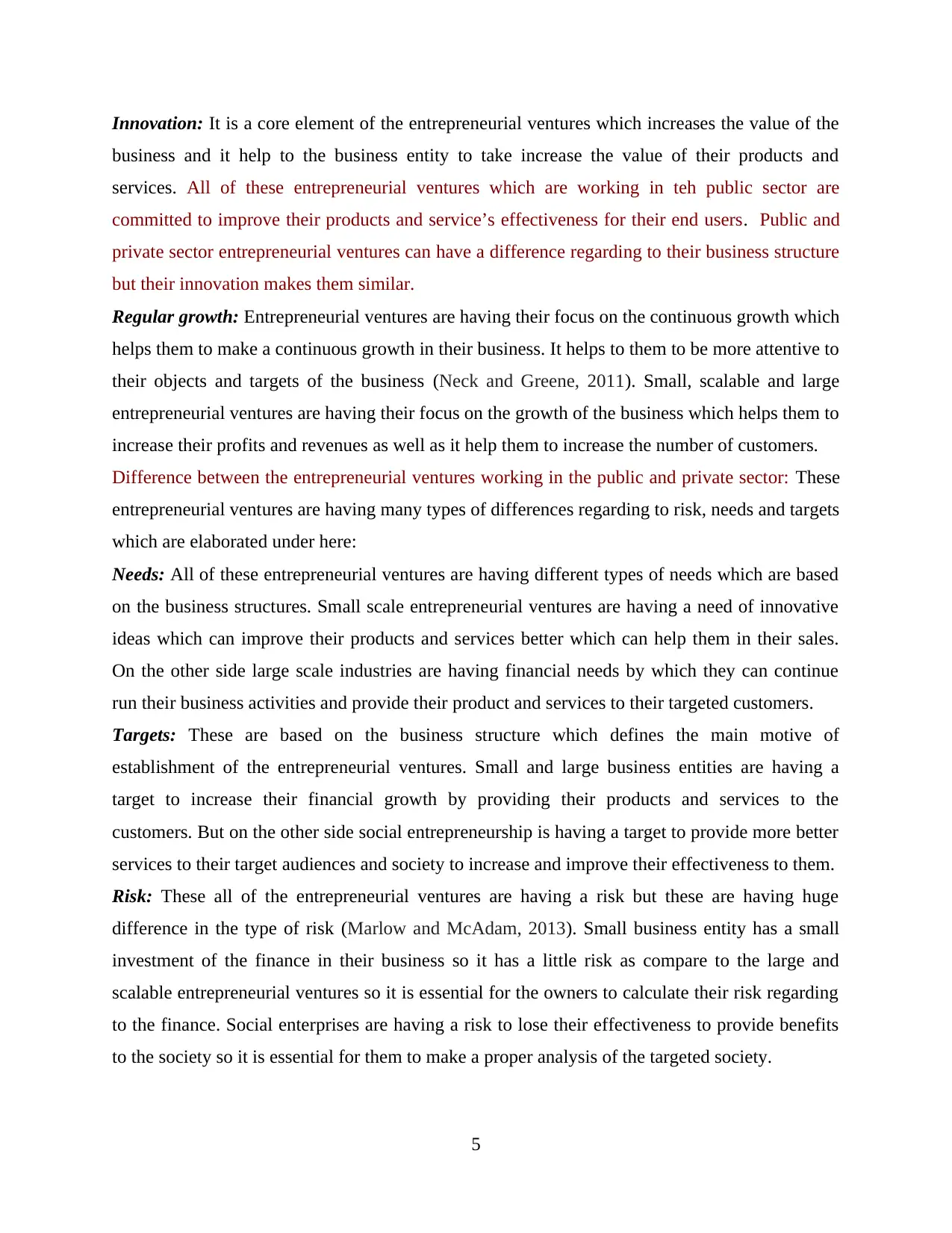
Innovation: It is a core element of the entrepreneurial ventures which increases the value of the
business and it help to the business entity to take increase the value of their products and
services. All of these entrepreneurial ventures which are working in teh public sector are
committed to improve their products and service’s effectiveness for their end users. Public and
private sector entrepreneurial ventures can have a difference regarding to their business structure
but their innovation makes them similar.
Regular growth: Entrepreneurial ventures are having their focus on the continuous growth which
helps them to make a continuous growth in their business. It helps to them to be more attentive to
their objects and targets of the business (Neck and Greene, 2011). Small, scalable and large
entrepreneurial ventures are having their focus on the growth of the business which helps them to
increase their profits and revenues as well as it help them to increase the number of customers.
Difference between the entrepreneurial ventures working in the public and private sector: These
entrepreneurial ventures are having many types of differences regarding to risk, needs and targets
which are elaborated under here:
Needs: All of these entrepreneurial ventures are having different types of needs which are based
on the business structures. Small scale entrepreneurial ventures are having a need of innovative
ideas which can improve their products and services better which can help them in their sales.
On the other side large scale industries are having financial needs by which they can continue
run their business activities and provide their product and services to their targeted customers.
Targets: These are based on the business structure which defines the main motive of
establishment of the entrepreneurial ventures. Small and large business entities are having a
target to increase their financial growth by providing their products and services to the
customers. But on the other side social entrepreneurship is having a target to provide more better
services to their target audiences and society to increase and improve their effectiveness to them.
Risk: These all of the entrepreneurial ventures are having a risk but these are having huge
difference in the type of risk (Marlow and McAdam, 2013). Small business entity has a small
investment of the finance in their business so it has a little risk as compare to the large and
scalable entrepreneurial ventures so it is essential for the owners to calculate their risk regarding
to the finance. Social enterprises are having a risk to lose their effectiveness to provide benefits
to the society so it is essential for them to make a proper analysis of the targeted society.
5
business and it help to the business entity to take increase the value of their products and
services. All of these entrepreneurial ventures which are working in teh public sector are
committed to improve their products and service’s effectiveness for their end users. Public and
private sector entrepreneurial ventures can have a difference regarding to their business structure
but their innovation makes them similar.
Regular growth: Entrepreneurial ventures are having their focus on the continuous growth which
helps them to make a continuous growth in their business. It helps to them to be more attentive to
their objects and targets of the business (Neck and Greene, 2011). Small, scalable and large
entrepreneurial ventures are having their focus on the growth of the business which helps them to
increase their profits and revenues as well as it help them to increase the number of customers.
Difference between the entrepreneurial ventures working in the public and private sector: These
entrepreneurial ventures are having many types of differences regarding to risk, needs and targets
which are elaborated under here:
Needs: All of these entrepreneurial ventures are having different types of needs which are based
on the business structures. Small scale entrepreneurial ventures are having a need of innovative
ideas which can improve their products and services better which can help them in their sales.
On the other side large scale industries are having financial needs by which they can continue
run their business activities and provide their product and services to their targeted customers.
Targets: These are based on the business structure which defines the main motive of
establishment of the entrepreneurial ventures. Small and large business entities are having a
target to increase their financial growth by providing their products and services to the
customers. But on the other side social entrepreneurship is having a target to provide more better
services to their target audiences and society to increase and improve their effectiveness to them.
Risk: These all of the entrepreneurial ventures are having a risk but these are having huge
difference in the type of risk (Marlow and McAdam, 2013). Small business entity has a small
investment of the finance in their business so it has a little risk as compare to the large and
scalable entrepreneurial ventures so it is essential for the owners to calculate their risk regarding
to the finance. Social enterprises are having a risk to lose their effectiveness to provide benefits
to the society so it is essential for them to make a proper analysis of the targeted society.
5
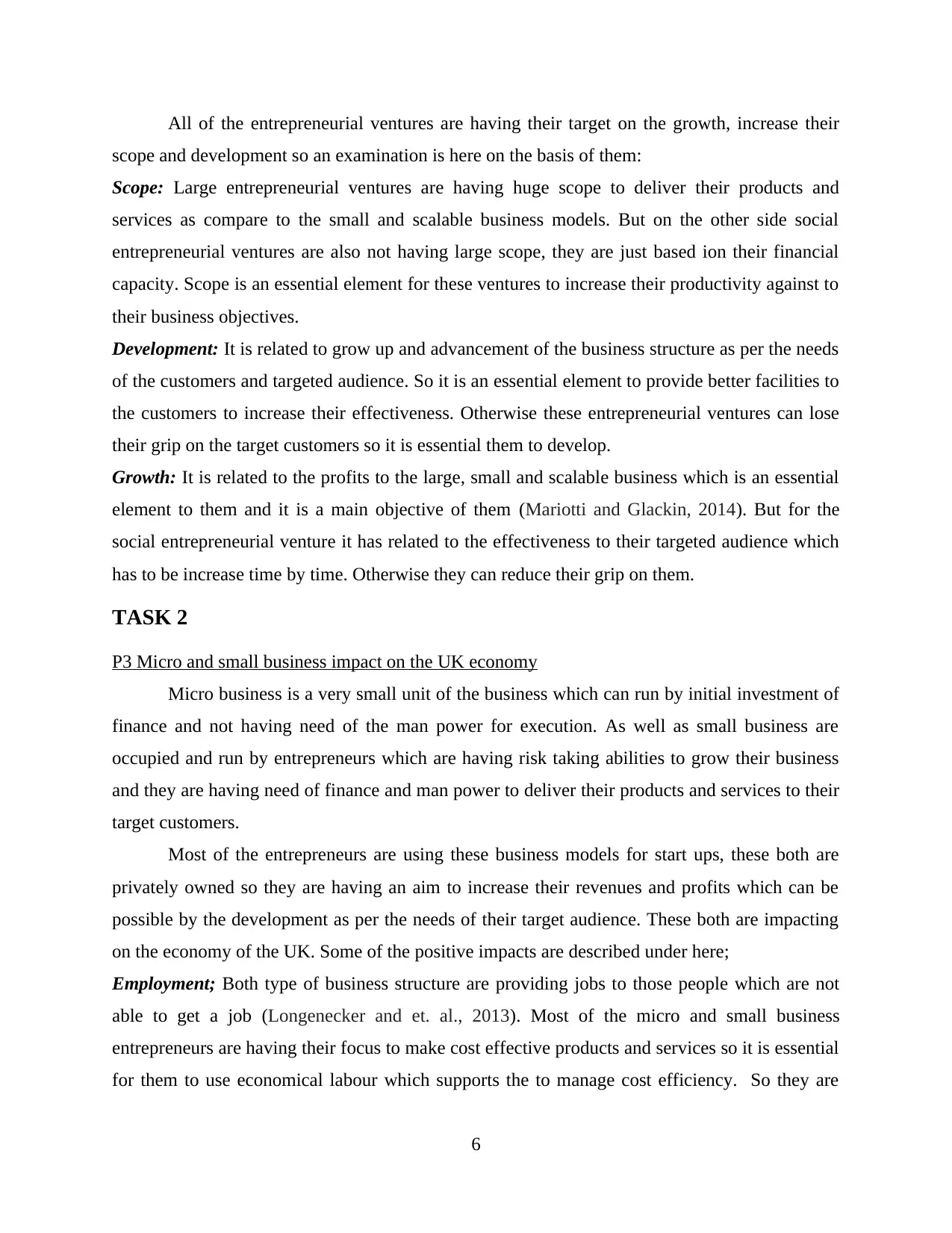
All of the entrepreneurial ventures are having their target on the growth, increase their
scope and development so an examination is here on the basis of them:
Scope: Large entrepreneurial ventures are having huge scope to deliver their products and
services as compare to the small and scalable business models. But on the other side social
entrepreneurial ventures are also not having large scope, they are just based ion their financial
capacity. Scope is an essential element for these ventures to increase their productivity against to
their business objectives.
Development: It is related to grow up and advancement of the business structure as per the needs
of the customers and targeted audience. So it is an essential element to provide better facilities to
the customers to increase their effectiveness. Otherwise these entrepreneurial ventures can lose
their grip on the target customers so it is essential them to develop.
Growth: It is related to the profits to the large, small and scalable business which is an essential
element to them and it is a main objective of them (Mariotti and Glackin, 2014). But for the
social entrepreneurial venture it has related to the effectiveness to their targeted audience which
has to be increase time by time. Otherwise they can reduce their grip on them.
TASK 2
P3 Micro and small business impact on the UK economy
Micro business is a very small unit of the business which can run by initial investment of
finance and not having need of the man power for execution. As well as small business are
occupied and run by entrepreneurs which are having risk taking abilities to grow their business
and they are having need of finance and man power to deliver their products and services to their
target customers.
Most of the entrepreneurs are using these business models for start ups, these both are
privately owned so they are having an aim to increase their revenues and profits which can be
possible by the development as per the needs of their target audience. These both are impacting
on the economy of the UK. Some of the positive impacts are described under here;
Employment; Both type of business structure are providing jobs to those people which are not
able to get a job (Longenecker and et. al., 2013). Most of the micro and small business
entrepreneurs are having their focus to make cost effective products and services so it is essential
for them to use economical labour which supports the to manage cost efficiency. So they are
6
scope and development so an examination is here on the basis of them:
Scope: Large entrepreneurial ventures are having huge scope to deliver their products and
services as compare to the small and scalable business models. But on the other side social
entrepreneurial ventures are also not having large scope, they are just based ion their financial
capacity. Scope is an essential element for these ventures to increase their productivity against to
their business objectives.
Development: It is related to grow up and advancement of the business structure as per the needs
of the customers and targeted audience. So it is an essential element to provide better facilities to
the customers to increase their effectiveness. Otherwise these entrepreneurial ventures can lose
their grip on the target customers so it is essential them to develop.
Growth: It is related to the profits to the large, small and scalable business which is an essential
element to them and it is a main objective of them (Mariotti and Glackin, 2014). But for the
social entrepreneurial venture it has related to the effectiveness to their targeted audience which
has to be increase time by time. Otherwise they can reduce their grip on them.
TASK 2
P3 Micro and small business impact on the UK economy
Micro business is a very small unit of the business which can run by initial investment of
finance and not having need of the man power for execution. As well as small business are
occupied and run by entrepreneurs which are having risk taking abilities to grow their business
and they are having need of finance and man power to deliver their products and services to their
target customers.
Most of the entrepreneurs are using these business models for start ups, these both are
privately owned so they are having an aim to increase their revenues and profits which can be
possible by the development as per the needs of their target audience. These both are impacting
on the economy of the UK. Some of the positive impacts are described under here;
Employment; Both type of business structure are providing jobs to those people which are not
able to get a job (Longenecker and et. al., 2013). Most of the micro and small business
entrepreneurs are having their focus to make cost effective products and services so it is essential
for them to use economical labour which supports the to manage cost efficiency. So they are
6
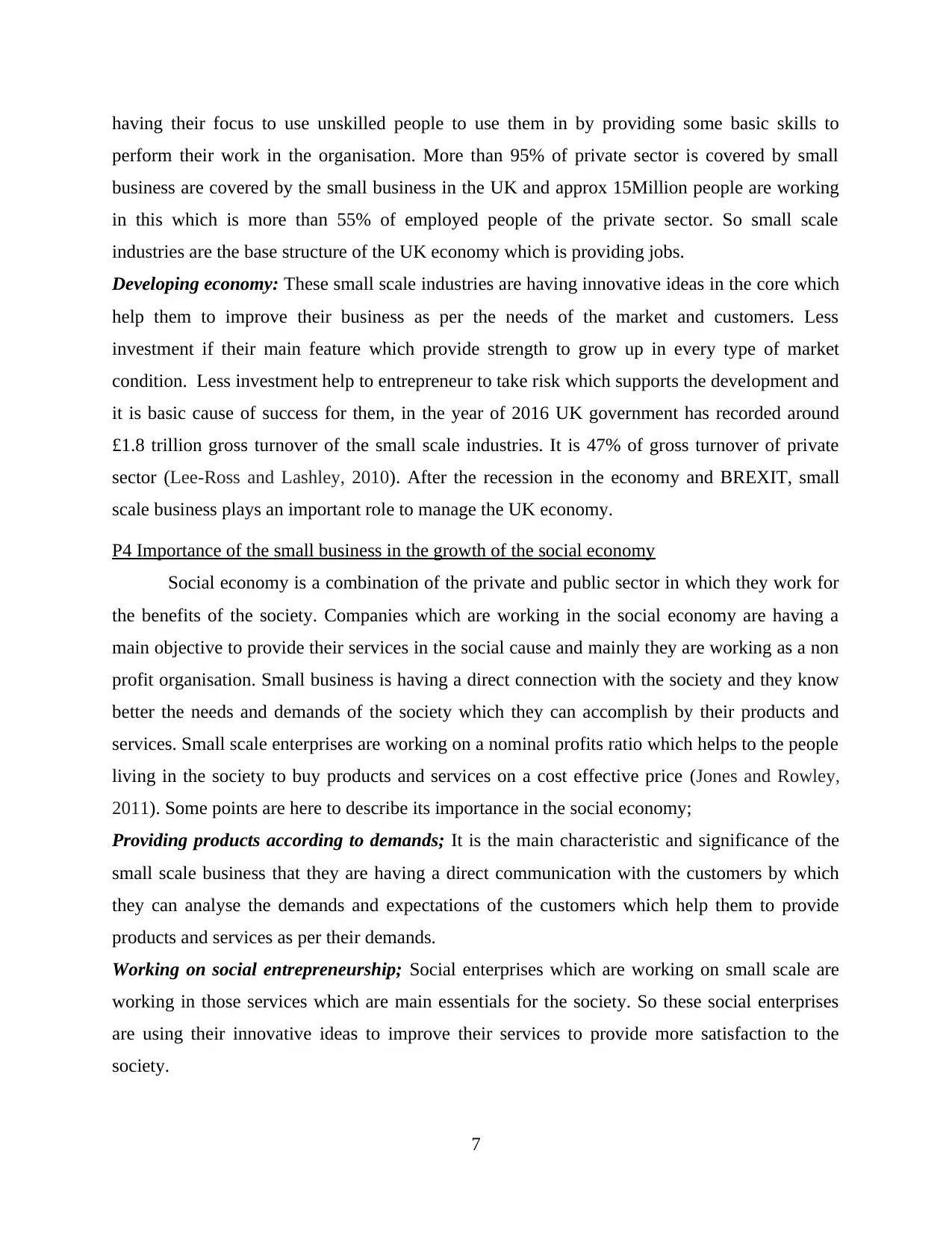
having their focus to use unskilled people to use them in by providing some basic skills to
perform their work in the organisation. More than 95% of private sector is covered by small
business are covered by the small business in the UK and approx 15Million people are working
in this which is more than 55% of employed people of the private sector. So small scale
industries are the base structure of the UK economy which is providing jobs.
Developing economy: These small scale industries are having innovative ideas in the core which
help them to improve their business as per the needs of the market and customers. Less
investment if their main feature which provide strength to grow up in every type of market
condition. Less investment help to entrepreneur to take risk which supports the development and
it is basic cause of success for them, in the year of 2016 UK government has recorded around
£1.8 trillion gross turnover of the small scale industries. It is 47% of gross turnover of private
sector (Lee-Ross and Lashley, 2010). After the recession in the economy and BREXIT, small
scale business plays an important role to manage the UK economy.
P4 Importance of the small business in the growth of the social economy
Social economy is a combination of the private and public sector in which they work for
the benefits of the society. Companies which are working in the social economy are having a
main objective to provide their services in the social cause and mainly they are working as a non
profit organisation. Small business is having a direct connection with the society and they know
better the needs and demands of the society which they can accomplish by their products and
services. Small scale enterprises are working on a nominal profits ratio which helps to the people
living in the society to buy products and services on a cost effective price (Jones and Rowley,
2011). Some points are here to describe its importance in the social economy;
Providing products according to demands; It is the main characteristic and significance of the
small scale business that they are having a direct communication with the customers by which
they can analyse the demands and expectations of the customers which help them to provide
products and services as per their demands.
Working on social entrepreneurship; Social enterprises which are working on small scale are
working in those services which are main essentials for the society. So these social enterprises
are using their innovative ideas to improve their services to provide more satisfaction to the
society.
7
perform their work in the organisation. More than 95% of private sector is covered by small
business are covered by the small business in the UK and approx 15Million people are working
in this which is more than 55% of employed people of the private sector. So small scale
industries are the base structure of the UK economy which is providing jobs.
Developing economy: These small scale industries are having innovative ideas in the core which
help them to improve their business as per the needs of the market and customers. Less
investment if their main feature which provide strength to grow up in every type of market
condition. Less investment help to entrepreneur to take risk which supports the development and
it is basic cause of success for them, in the year of 2016 UK government has recorded around
£1.8 trillion gross turnover of the small scale industries. It is 47% of gross turnover of private
sector (Lee-Ross and Lashley, 2010). After the recession in the economy and BREXIT, small
scale business plays an important role to manage the UK economy.
P4 Importance of the small business in the growth of the social economy
Social economy is a combination of the private and public sector in which they work for
the benefits of the society. Companies which are working in the social economy are having a
main objective to provide their services in the social cause and mainly they are working as a non
profit organisation. Small business is having a direct connection with the society and they know
better the needs and demands of the society which they can accomplish by their products and
services. Small scale enterprises are working on a nominal profits ratio which helps to the people
living in the society to buy products and services on a cost effective price (Jones and Rowley,
2011). Some points are here to describe its importance in the social economy;
Providing products according to demands; It is the main characteristic and significance of the
small scale business that they are having a direct communication with the customers by which
they can analyse the demands and expectations of the customers which help them to provide
products and services as per their demands.
Working on social entrepreneurship; Social enterprises which are working on small scale are
working in those services which are main essentials for the society. So these social enterprises
are using their innovative ideas to improve their services to provide more satisfaction to the
society.
7
Paraphrase This Document
Need a fresh take? Get an instant paraphrase of this document with our AI Paraphraser
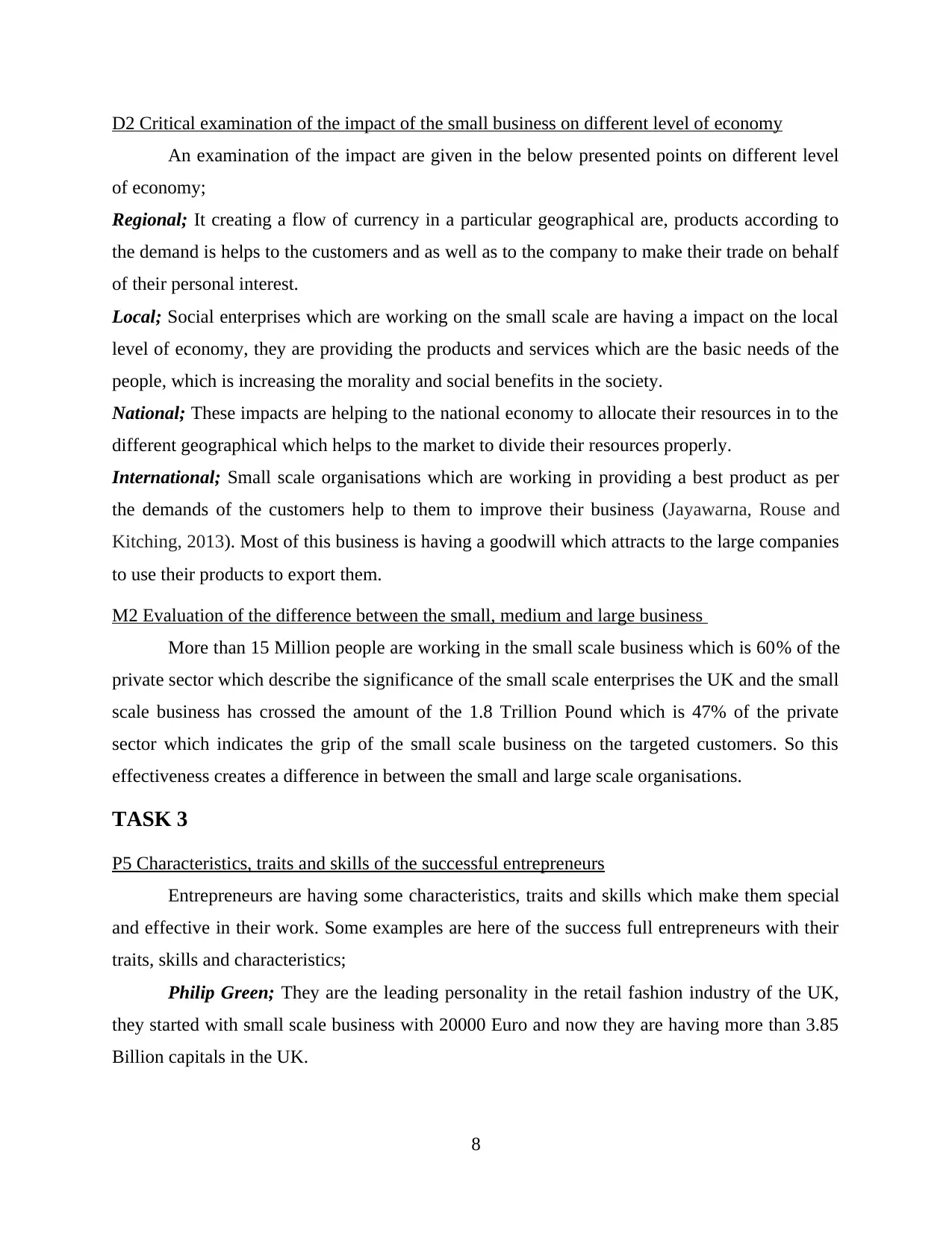
D2 Critical examination of the impact of the small business on different level of economy
An examination of the impact are given in the below presented points on different level
of economy;
Regional; It creating a flow of currency in a particular geographical are, products according to
the demand is helps to the customers and as well as to the company to make their trade on behalf
of their personal interest.
Local; Social enterprises which are working on the small scale are having a impact on the local
level of economy, they are providing the products and services which are the basic needs of the
people, which is increasing the morality and social benefits in the society.
National; These impacts are helping to the national economy to allocate their resources in to the
different geographical which helps to the market to divide their resources properly.
International; Small scale organisations which are working in providing a best product as per
the demands of the customers help to them to improve their business (Jayawarna, Rouse and
Kitching, 2013). Most of this business is having a goodwill which attracts to the large companies
to use their products to export them.
M2 Evaluation of the difference between the small, medium and large business
More than 15 Million people are working in the small scale business which is 60% of the
private sector which describe the significance of the small scale enterprises the UK and the small
scale business has crossed the amount of the 1.8 Trillion Pound which is 47% of the private
sector which indicates the grip of the small scale business on the targeted customers. So this
effectiveness creates a difference in between the small and large scale organisations.
TASK 3
P5 Characteristics, traits and skills of the successful entrepreneurs
Entrepreneurs are having some characteristics, traits and skills which make them special
and effective in their work. Some examples are here of the success full entrepreneurs with their
traits, skills and characteristics;
Philip Green; They are the leading personality in the retail fashion industry of the UK,
they started with small scale business with 20000 Euro and now they are having more than 3.85
Billion capitals in the UK.
8
An examination of the impact are given in the below presented points on different level
of economy;
Regional; It creating a flow of currency in a particular geographical are, products according to
the demand is helps to the customers and as well as to the company to make their trade on behalf
of their personal interest.
Local; Social enterprises which are working on the small scale are having a impact on the local
level of economy, they are providing the products and services which are the basic needs of the
people, which is increasing the morality and social benefits in the society.
National; These impacts are helping to the national economy to allocate their resources in to the
different geographical which helps to the market to divide their resources properly.
International; Small scale organisations which are working in providing a best product as per
the demands of the customers help to them to improve their business (Jayawarna, Rouse and
Kitching, 2013). Most of this business is having a goodwill which attracts to the large companies
to use their products to export them.
M2 Evaluation of the difference between the small, medium and large business
More than 15 Million people are working in the small scale business which is 60% of the
private sector which describe the significance of the small scale enterprises the UK and the small
scale business has crossed the amount of the 1.8 Trillion Pound which is 47% of the private
sector which indicates the grip of the small scale business on the targeted customers. So this
effectiveness creates a difference in between the small and large scale organisations.
TASK 3
P5 Characteristics, traits and skills of the successful entrepreneurs
Entrepreneurs are having some characteristics, traits and skills which make them special
and effective in their work. Some examples are here of the success full entrepreneurs with their
traits, skills and characteristics;
Philip Green; They are the leading personality in the retail fashion industry of the UK,
they started with small scale business with 20000 Euro and now they are having more than 3.85
Billion capitals in the UK.
8
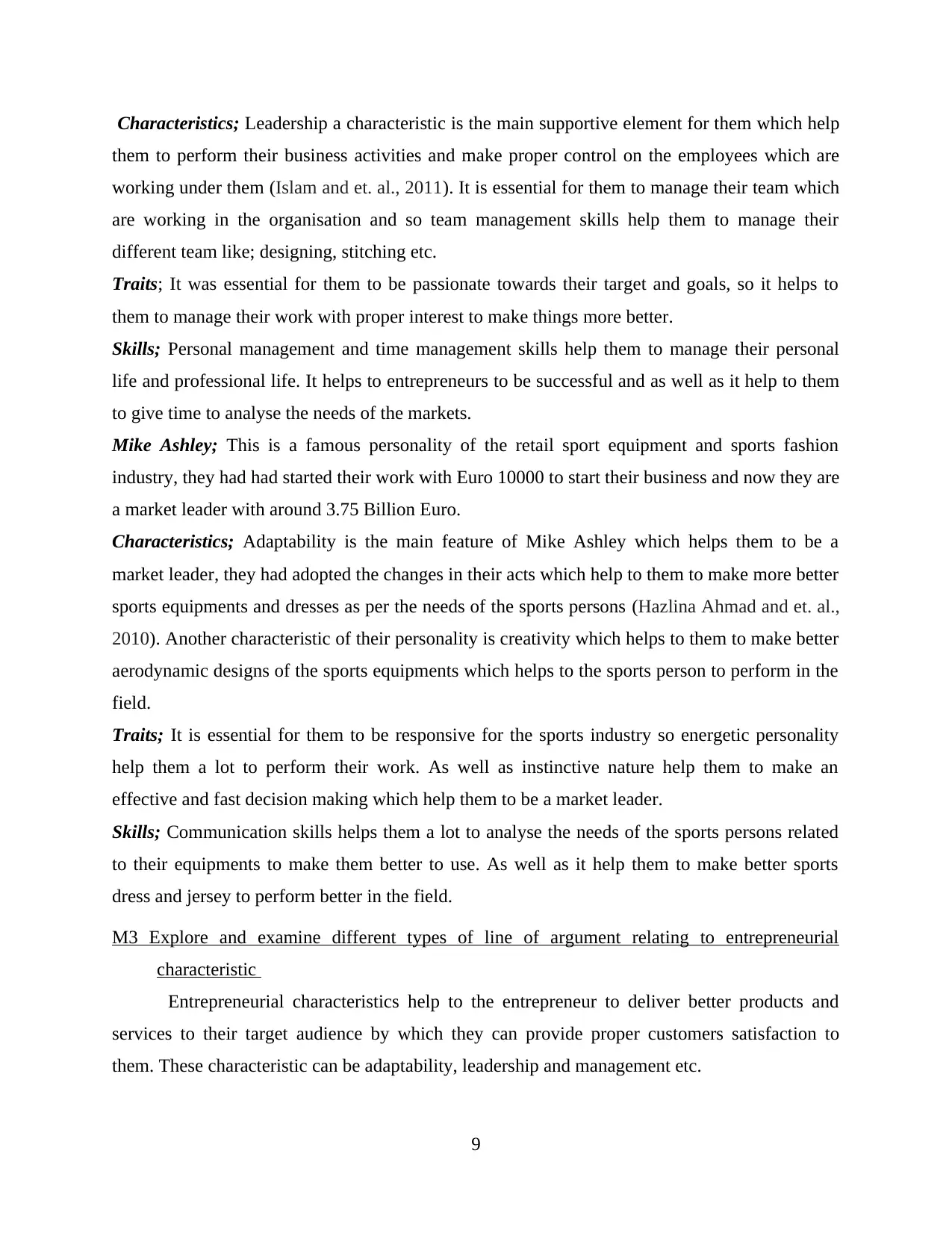
Characteristics; Leadership a characteristic is the main supportive element for them which help
them to perform their business activities and make proper control on the employees which are
working under them (Islam and et. al., 2011). It is essential for them to manage their team which
are working in the organisation and so team management skills help them to manage their
different team like; designing, stitching etc.
Traits; It was essential for them to be passionate towards their target and goals, so it helps to
them to manage their work with proper interest to make things more better.
Skills; Personal management and time management skills help them to manage their personal
life and professional life. It helps to entrepreneurs to be successful and as well as it help to them
to give time to analyse the needs of the markets.
Mike Ashley; This is a famous personality of the retail sport equipment and sports fashion
industry, they had had started their work with Euro 10000 to start their business and now they are
a market leader with around 3.75 Billion Euro.
Characteristics; Adaptability is the main feature of Mike Ashley which helps them to be a
market leader, they had adopted the changes in their acts which help to them to make more better
sports equipments and dresses as per the needs of the sports persons (Hazlina Ahmad and et. al.,
2010). Another characteristic of their personality is creativity which helps to them to make better
aerodynamic designs of the sports equipments which helps to the sports person to perform in the
field.
Traits; It is essential for them to be responsive for the sports industry so energetic personality
help them a lot to perform their work. As well as instinctive nature help them to make an
effective and fast decision making which help them to be a market leader.
Skills; Communication skills helps them a lot to analyse the needs of the sports persons related
to their equipments to make them better to use. As well as it help them to make better sports
dress and jersey to perform better in the field.
M3 Explore and examine different types of line of argument relating to entrepreneurial
characteristic
Entrepreneurial characteristics help to the entrepreneur to deliver better products and
services to their target audience by which they can provide proper customers satisfaction to
them. These characteristic can be adaptability, leadership and management etc.
9
them to perform their business activities and make proper control on the employees which are
working under them (Islam and et. al., 2011). It is essential for them to manage their team which
are working in the organisation and so team management skills help them to manage their
different team like; designing, stitching etc.
Traits; It was essential for them to be passionate towards their target and goals, so it helps to
them to manage their work with proper interest to make things more better.
Skills; Personal management and time management skills help them to manage their personal
life and professional life. It helps to entrepreneurs to be successful and as well as it help to them
to give time to analyse the needs of the markets.
Mike Ashley; This is a famous personality of the retail sport equipment and sports fashion
industry, they had had started their work with Euro 10000 to start their business and now they are
a market leader with around 3.75 Billion Euro.
Characteristics; Adaptability is the main feature of Mike Ashley which helps them to be a
market leader, they had adopted the changes in their acts which help to them to make more better
sports equipments and dresses as per the needs of the sports persons (Hazlina Ahmad and et. al.,
2010). Another characteristic of their personality is creativity which helps to them to make better
aerodynamic designs of the sports equipments which helps to the sports person to perform in the
field.
Traits; It is essential for them to be responsive for the sports industry so energetic personality
help them a lot to perform their work. As well as instinctive nature help them to make an
effective and fast decision making which help them to be a market leader.
Skills; Communication skills helps them a lot to analyse the needs of the sports persons related
to their equipments to make them better to use. As well as it help them to make better sports
dress and jersey to perform better in the field.
M3 Explore and examine different types of line of argument relating to entrepreneurial
characteristic
Entrepreneurial characteristics help to the entrepreneur to deliver better products and
services to their target audience by which they can provide proper customers satisfaction to
them. These characteristic can be adaptability, leadership and management etc.
9
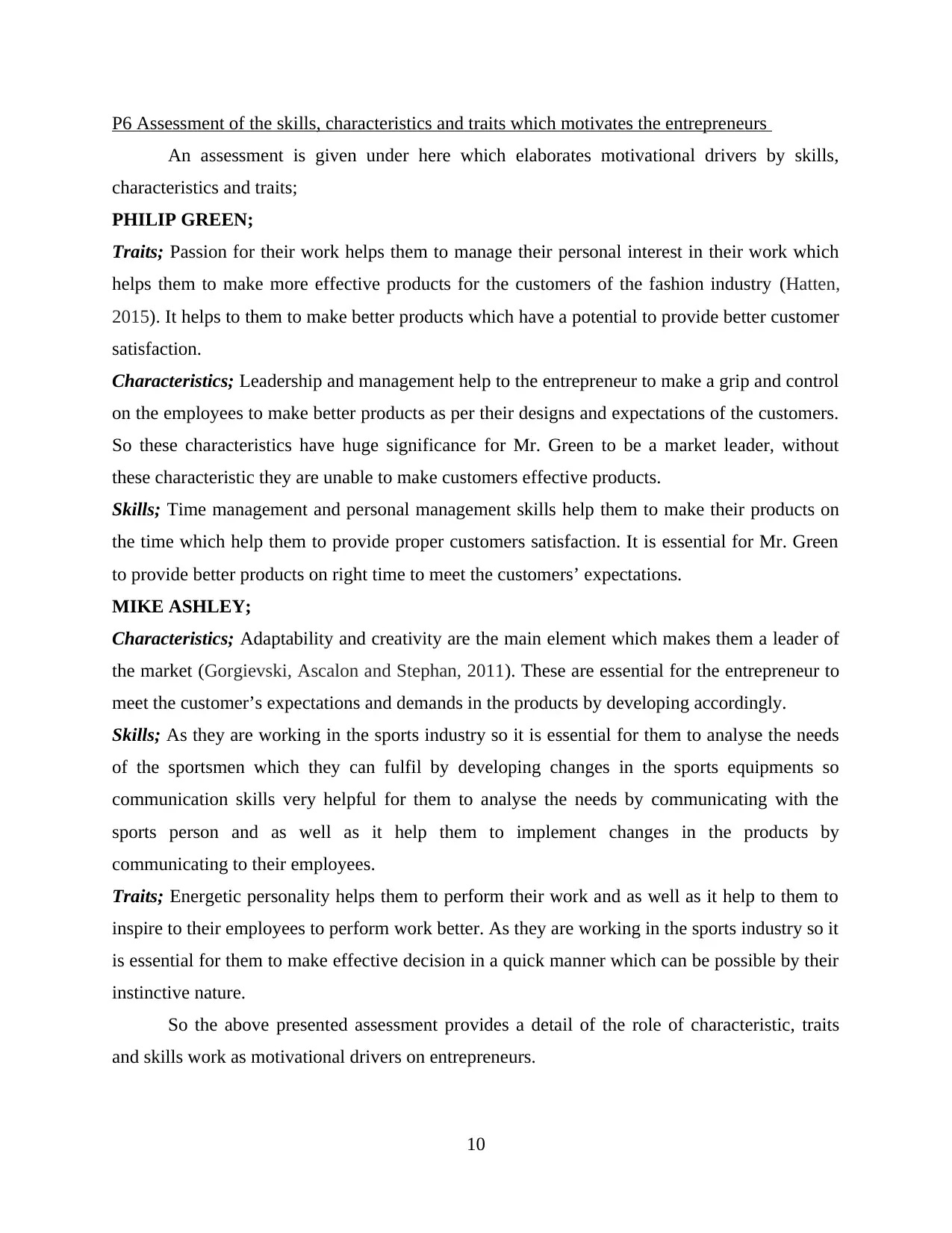
P6 Assessment of the skills, characteristics and traits which motivates the entrepreneurs
An assessment is given under here which elaborates motivational drivers by skills,
characteristics and traits;
PHILIP GREEN;
Traits; Passion for their work helps them to manage their personal interest in their work which
helps them to make more effective products for the customers of the fashion industry (Hatten,
2015). It helps to them to make better products which have a potential to provide better customer
satisfaction.
Characteristics; Leadership and management help to the entrepreneur to make a grip and control
on the employees to make better products as per their designs and expectations of the customers.
So these characteristics have huge significance for Mr. Green to be a market leader, without
these characteristic they are unable to make customers effective products.
Skills; Time management and personal management skills help them to make their products on
the time which help them to provide proper customers satisfaction. It is essential for Mr. Green
to provide better products on right time to meet the customers’ expectations.
MIKE ASHLEY;
Characteristics; Adaptability and creativity are the main element which makes them a leader of
the market (Gorgievski, Ascalon and Stephan, 2011). These are essential for the entrepreneur to
meet the customer’s expectations and demands in the products by developing accordingly.
Skills; As they are working in the sports industry so it is essential for them to analyse the needs
of the sportsmen which they can fulfil by developing changes in the sports equipments so
communication skills very helpful for them to analyse the needs by communicating with the
sports person and as well as it help them to implement changes in the products by
communicating to their employees.
Traits; Energetic personality helps them to perform their work and as well as it help to them to
inspire to their employees to perform work better. As they are working in the sports industry so it
is essential for them to make effective decision in a quick manner which can be possible by their
instinctive nature.
So the above presented assessment provides a detail of the role of characteristic, traits
and skills work as motivational drivers on entrepreneurs.
10
An assessment is given under here which elaborates motivational drivers by skills,
characteristics and traits;
PHILIP GREEN;
Traits; Passion for their work helps them to manage their personal interest in their work which
helps them to make more effective products for the customers of the fashion industry (Hatten,
2015). It helps to them to make better products which have a potential to provide better customer
satisfaction.
Characteristics; Leadership and management help to the entrepreneur to make a grip and control
on the employees to make better products as per their designs and expectations of the customers.
So these characteristics have huge significance for Mr. Green to be a market leader, without
these characteristic they are unable to make customers effective products.
Skills; Time management and personal management skills help them to make their products on
the time which help them to provide proper customers satisfaction. It is essential for Mr. Green
to provide better products on right time to meet the customers’ expectations.
MIKE ASHLEY;
Characteristics; Adaptability and creativity are the main element which makes them a leader of
the market (Gorgievski, Ascalon and Stephan, 2011). These are essential for the entrepreneur to
meet the customer’s expectations and demands in the products by developing accordingly.
Skills; As they are working in the sports industry so it is essential for them to analyse the needs
of the sportsmen which they can fulfil by developing changes in the sports equipments so
communication skills very helpful for them to analyse the needs by communicating with the
sports person and as well as it help them to implement changes in the products by
communicating to their employees.
Traits; Energetic personality helps them to perform their work and as well as it help to them to
inspire to their employees to perform work better. As they are working in the sports industry so it
is essential for them to make effective decision in a quick manner which can be possible by their
instinctive nature.
So the above presented assessment provides a detail of the role of characteristic, traits
and skills work as motivational drivers on entrepreneurs.
10
Secure Best Marks with AI Grader
Need help grading? Try our AI Grader for instant feedback on your assignments.
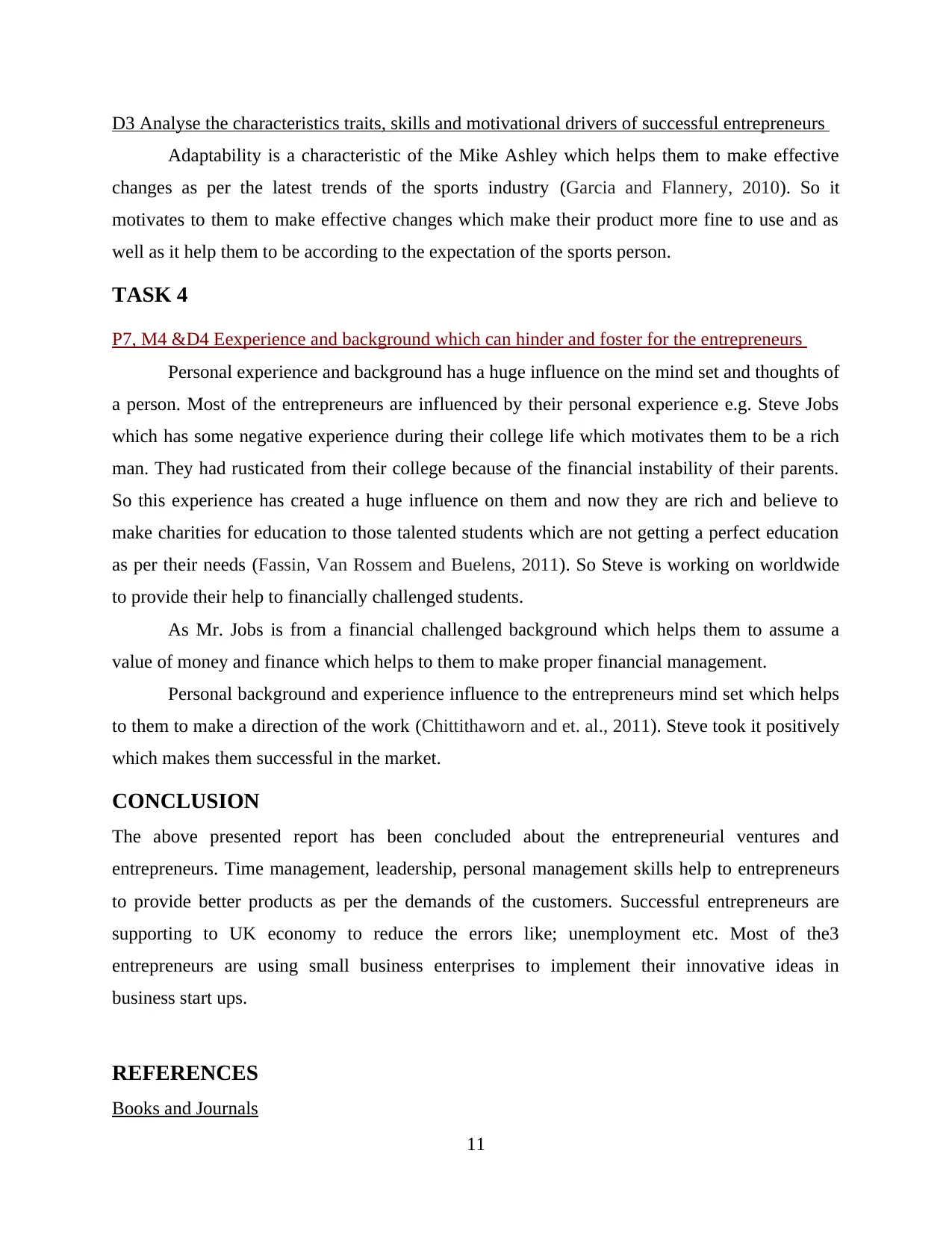
D3 Analyse the characteristics traits, skills and motivational drivers of successful entrepreneurs
Adaptability is a characteristic of the Mike Ashley which helps them to make effective
changes as per the latest trends of the sports industry (Garcia and Flannery, 2010). So it
motivates to them to make effective changes which make their product more fine to use and as
well as it help them to be according to the expectation of the sports person.
TASK 4
P7, M4 &D4 Eexperience and background which can hinder and foster for the entrepreneurs
Personal experience and background has a huge influence on the mind set and thoughts of
a person. Most of the entrepreneurs are influenced by their personal experience e.g. Steve Jobs
which has some negative experience during their college life which motivates them to be a rich
man. They had rusticated from their college because of the financial instability of their parents.
So this experience has created a huge influence on them and now they are rich and believe to
make charities for education to those talented students which are not getting a perfect education
as per their needs (Fassin, Van Rossem and Buelens, 2011). So Steve is working on worldwide
to provide their help to financially challenged students.
As Mr. Jobs is from a financial challenged background which helps them to assume a
value of money and finance which helps to them to make proper financial management.
Personal background and experience influence to the entrepreneurs mind set which helps
to them to make a direction of the work (Chittithaworn and et. al., 2011). Steve took it positively
which makes them successful in the market.
CONCLUSION
The above presented report has been concluded about the entrepreneurial ventures and
entrepreneurs. Time management, leadership, personal management skills help to entrepreneurs
to provide better products as per the demands of the customers. Successful entrepreneurs are
supporting to UK economy to reduce the errors like; unemployment etc. Most of the3
entrepreneurs are using small business enterprises to implement their innovative ideas in
business start ups.
REFERENCES
Books and Journals
11
Adaptability is a characteristic of the Mike Ashley which helps them to make effective
changes as per the latest trends of the sports industry (Garcia and Flannery, 2010). So it
motivates to them to make effective changes which make their product more fine to use and as
well as it help them to be according to the expectation of the sports person.
TASK 4
P7, M4 &D4 Eexperience and background which can hinder and foster for the entrepreneurs
Personal experience and background has a huge influence on the mind set and thoughts of
a person. Most of the entrepreneurs are influenced by their personal experience e.g. Steve Jobs
which has some negative experience during their college life which motivates them to be a rich
man. They had rusticated from their college because of the financial instability of their parents.
So this experience has created a huge influence on them and now they are rich and believe to
make charities for education to those talented students which are not getting a perfect education
as per their needs (Fassin, Van Rossem and Buelens, 2011). So Steve is working on worldwide
to provide their help to financially challenged students.
As Mr. Jobs is from a financial challenged background which helps them to assume a
value of money and finance which helps to them to make proper financial management.
Personal background and experience influence to the entrepreneurs mind set which helps
to them to make a direction of the work (Chittithaworn and et. al., 2011). Steve took it positively
which makes them successful in the market.
CONCLUSION
The above presented report has been concluded about the entrepreneurial ventures and
entrepreneurs. Time management, leadership, personal management skills help to entrepreneurs
to provide better products as per the demands of the customers. Successful entrepreneurs are
supporting to UK economy to reduce the errors like; unemployment etc. Most of the3
entrepreneurs are using small business enterprises to implement their innovative ideas in
business start ups.
REFERENCES
Books and Journals
11
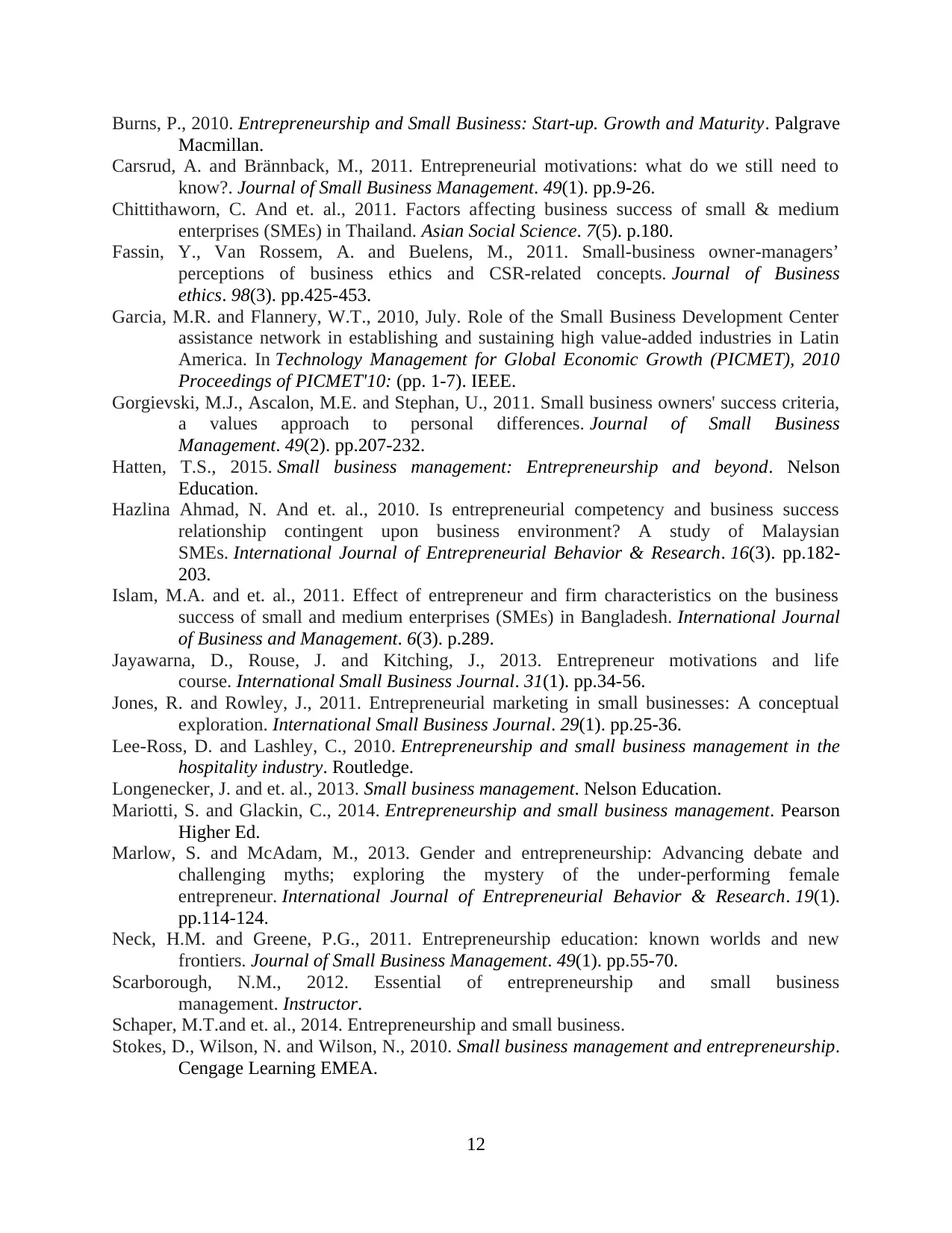
Burns, P., 2010. Entrepreneurship and Small Business: Start-up. Growth and Maturity. Palgrave
Macmillan.
Carsrud, A. and Brännback, M., 2011. Entrepreneurial motivations: what do we still need to
know?. Journal of Small Business Management. 49(1). pp.9-26.
Chittithaworn, C. And et. al., 2011. Factors affecting business success of small & medium
enterprises (SMEs) in Thailand. Asian Social Science. 7(5). p.180.
Fassin, Y., Van Rossem, A. and Buelens, M., 2011. Small-business owner-managers’
perceptions of business ethics and CSR-related concepts. Journal of Business
ethics. 98(3). pp.425-453.
Garcia, M.R. and Flannery, W.T., 2010, July. Role of the Small Business Development Center
assistance network in establishing and sustaining high value-added industries in Latin
America. In Technology Management for Global Economic Growth (PICMET), 2010
Proceedings of PICMET'10: (pp. 1-7). IEEE.
Gorgievski, M.J., Ascalon, M.E. and Stephan, U., 2011. Small business owners' success criteria,
a values approach to personal differences. Journal of Small Business
Management. 49(2). pp.207-232.
Hatten, T.S., 2015. Small business management: Entrepreneurship and beyond. Nelson
Education.
Hazlina Ahmad, N. And et. al., 2010. Is entrepreneurial competency and business success
relationship contingent upon business environment? A study of Malaysian
SMEs. International Journal of Entrepreneurial Behavior & Research. 16(3). pp.182-
203.
Islam, M.A. and et. al., 2011. Effect of entrepreneur and firm characteristics on the business
success of small and medium enterprises (SMEs) in Bangladesh. International Journal
of Business and Management. 6(3). p.289.
Jayawarna, D., Rouse, J. and Kitching, J., 2013. Entrepreneur motivations and life
course. International Small Business Journal. 31(1). pp.34-56.
Jones, R. and Rowley, J., 2011. Entrepreneurial marketing in small businesses: A conceptual
exploration. International Small Business Journal. 29(1). pp.25-36.
Lee-Ross, D. and Lashley, C., 2010. Entrepreneurship and small business management in the
hospitality industry. Routledge.
Longenecker, J. and et. al., 2013. Small business management. Nelson Education.
Mariotti, S. and Glackin, C., 2014. Entrepreneurship and small business management. Pearson
Higher Ed.
Marlow, S. and McAdam, M., 2013. Gender and entrepreneurship: Advancing debate and
challenging myths; exploring the mystery of the under-performing female
entrepreneur. International Journal of Entrepreneurial Behavior & Research. 19(1).
pp.114-124.
Neck, H.M. and Greene, P.G., 2011. Entrepreneurship education: known worlds and new
frontiers. Journal of Small Business Management. 49(1). pp.55-70.
Scarborough, N.M., 2012. Essential of entrepreneurship and small business
management. Instructor.
Schaper, M.T.and et. al., 2014. Entrepreneurship and small business.
Stokes, D., Wilson, N. and Wilson, N., 2010. Small business management and entrepreneurship.
Cengage Learning EMEA.
12
Macmillan.
Carsrud, A. and Brännback, M., 2011. Entrepreneurial motivations: what do we still need to
know?. Journal of Small Business Management. 49(1). pp.9-26.
Chittithaworn, C. And et. al., 2011. Factors affecting business success of small & medium
enterprises (SMEs) in Thailand. Asian Social Science. 7(5). p.180.
Fassin, Y., Van Rossem, A. and Buelens, M., 2011. Small-business owner-managers’
perceptions of business ethics and CSR-related concepts. Journal of Business
ethics. 98(3). pp.425-453.
Garcia, M.R. and Flannery, W.T., 2010, July. Role of the Small Business Development Center
assistance network in establishing and sustaining high value-added industries in Latin
America. In Technology Management for Global Economic Growth (PICMET), 2010
Proceedings of PICMET'10: (pp. 1-7). IEEE.
Gorgievski, M.J., Ascalon, M.E. and Stephan, U., 2011. Small business owners' success criteria,
a values approach to personal differences. Journal of Small Business
Management. 49(2). pp.207-232.
Hatten, T.S., 2015. Small business management: Entrepreneurship and beyond. Nelson
Education.
Hazlina Ahmad, N. And et. al., 2010. Is entrepreneurial competency and business success
relationship contingent upon business environment? A study of Malaysian
SMEs. International Journal of Entrepreneurial Behavior & Research. 16(3). pp.182-
203.
Islam, M.A. and et. al., 2011. Effect of entrepreneur and firm characteristics on the business
success of small and medium enterprises (SMEs) in Bangladesh. International Journal
of Business and Management. 6(3). p.289.
Jayawarna, D., Rouse, J. and Kitching, J., 2013. Entrepreneur motivations and life
course. International Small Business Journal. 31(1). pp.34-56.
Jones, R. and Rowley, J., 2011. Entrepreneurial marketing in small businesses: A conceptual
exploration. International Small Business Journal. 29(1). pp.25-36.
Lee-Ross, D. and Lashley, C., 2010. Entrepreneurship and small business management in the
hospitality industry. Routledge.
Longenecker, J. and et. al., 2013. Small business management. Nelson Education.
Mariotti, S. and Glackin, C., 2014. Entrepreneurship and small business management. Pearson
Higher Ed.
Marlow, S. and McAdam, M., 2013. Gender and entrepreneurship: Advancing debate and
challenging myths; exploring the mystery of the under-performing female
entrepreneur. International Journal of Entrepreneurial Behavior & Research. 19(1).
pp.114-124.
Neck, H.M. and Greene, P.G., 2011. Entrepreneurship education: known worlds and new
frontiers. Journal of Small Business Management. 49(1). pp.55-70.
Scarborough, N.M., 2012. Essential of entrepreneurship and small business
management. Instructor.
Schaper, M.T.and et. al., 2014. Entrepreneurship and small business.
Stokes, D., Wilson, N. and Wilson, N., 2010. Small business management and entrepreneurship.
Cengage Learning EMEA.
12
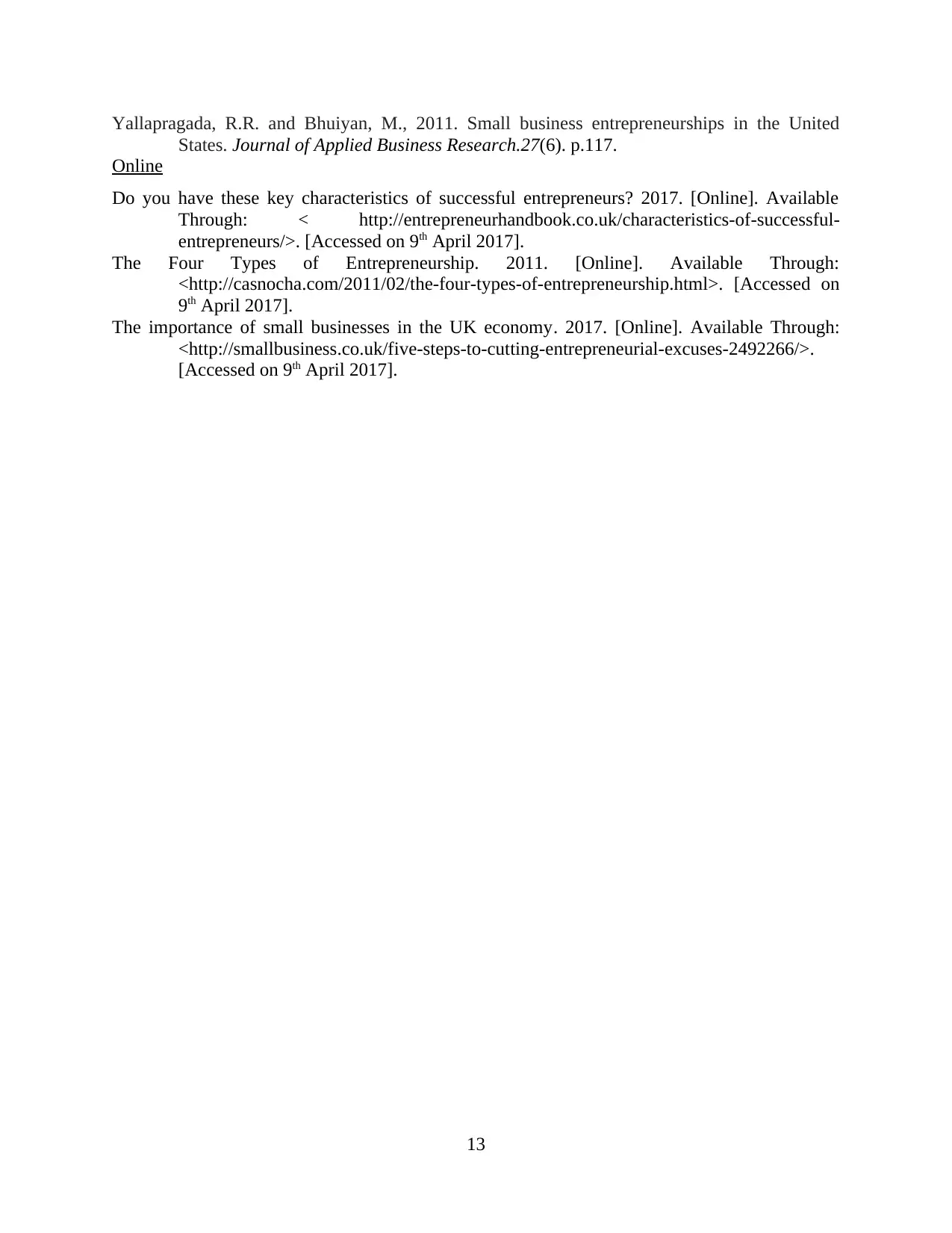
Yallapragada, R.R. and Bhuiyan, M., 2011. Small business entrepreneurships in the United
States. Journal of Applied Business Research.27(6). p.117.
Online
Do you have these key characteristics of successful entrepreneurs? 2017. [Online]. Available
Through: < http://entrepreneurhandbook.co.uk/characteristics-of-successful-
entrepreneurs/>. [Accessed on 9th April 2017].
The Four Types of Entrepreneurship. 2011. [Online]. Available Through:
<http://casnocha.com/2011/02/the-four-types-of-entrepreneurship.html>. [Accessed on
9th April 2017].
The importance of small businesses in the UK economy. 2017. [Online]. Available Through:
<http://smallbusiness.co.uk/five-steps-to-cutting-entrepreneurial-excuses-2492266/>.
[Accessed on 9th April 2017].
13
States. Journal of Applied Business Research.27(6). p.117.
Online
Do you have these key characteristics of successful entrepreneurs? 2017. [Online]. Available
Through: < http://entrepreneurhandbook.co.uk/characteristics-of-successful-
entrepreneurs/>. [Accessed on 9th April 2017].
The Four Types of Entrepreneurship. 2011. [Online]. Available Through:
<http://casnocha.com/2011/02/the-four-types-of-entrepreneurship.html>. [Accessed on
9th April 2017].
The importance of small businesses in the UK economy. 2017. [Online]. Available Through:
<http://smallbusiness.co.uk/five-steps-to-cutting-entrepreneurial-excuses-2492266/>.
[Accessed on 9th April 2017].
13
1 out of 13
Related Documents
Your All-in-One AI-Powered Toolkit for Academic Success.
+13062052269
info@desklib.com
Available 24*7 on WhatsApp / Email
![[object Object]](/_next/static/media/star-bottom.7253800d.svg)
Unlock your academic potential
© 2024 | Zucol Services PVT LTD | All rights reserved.




